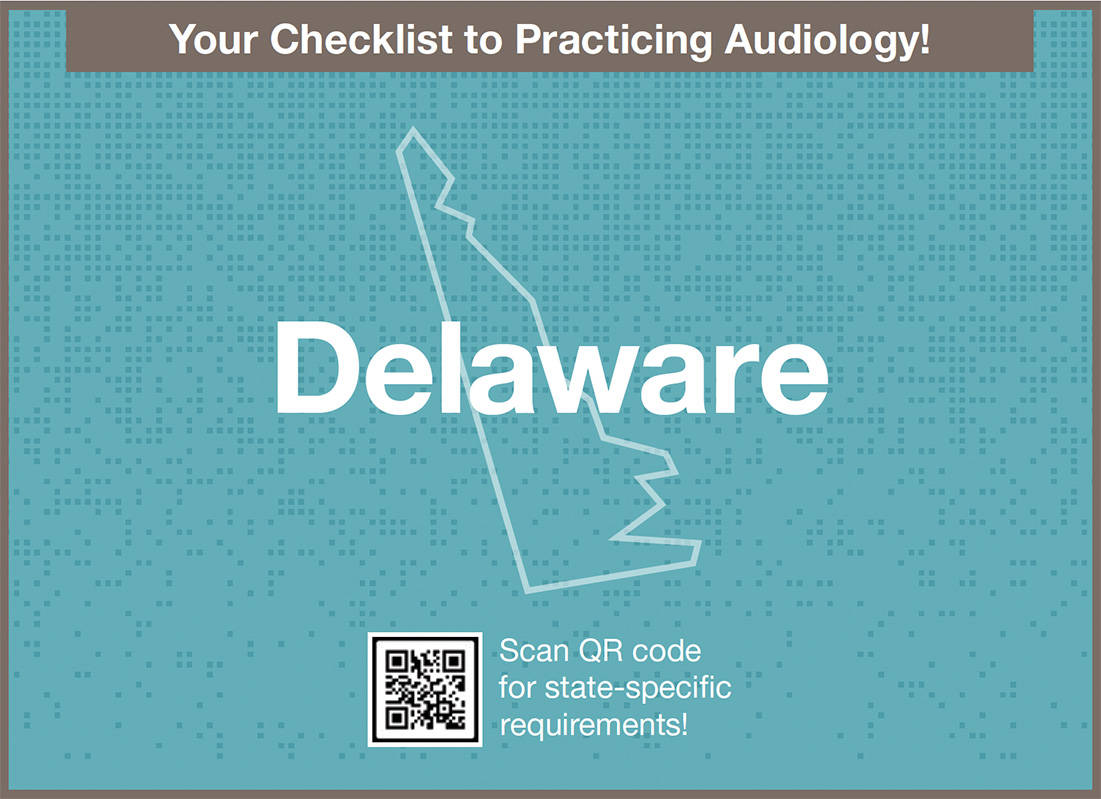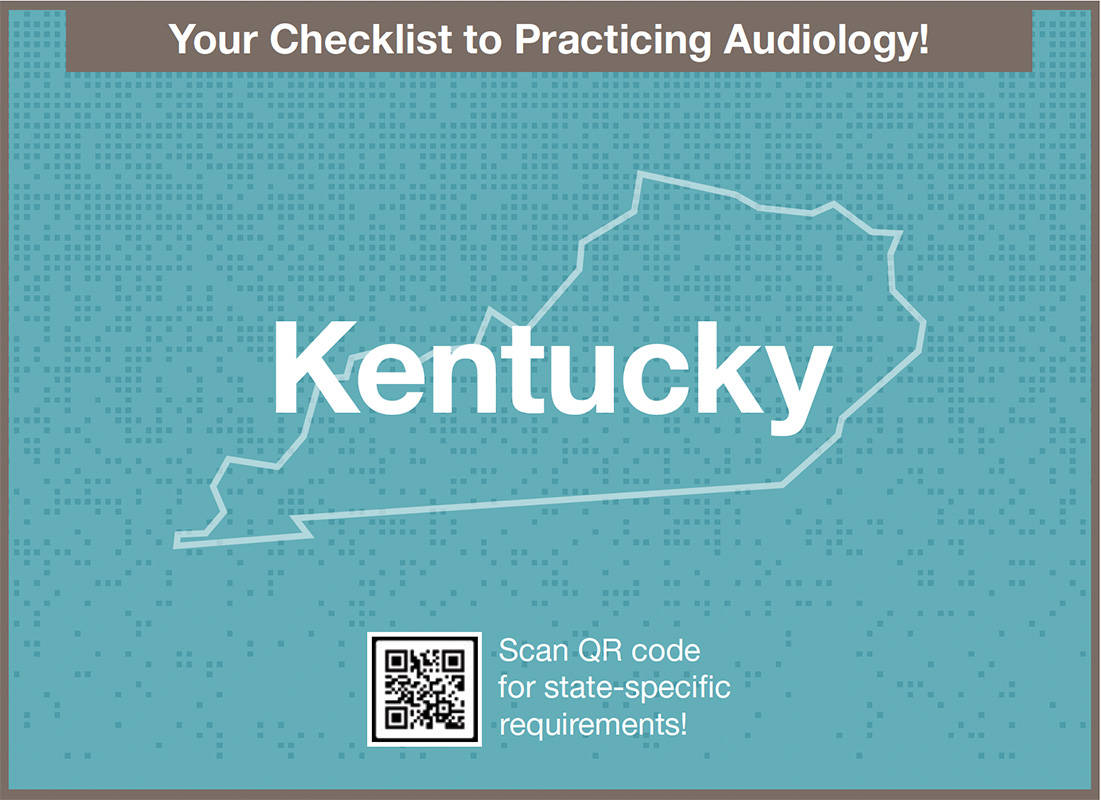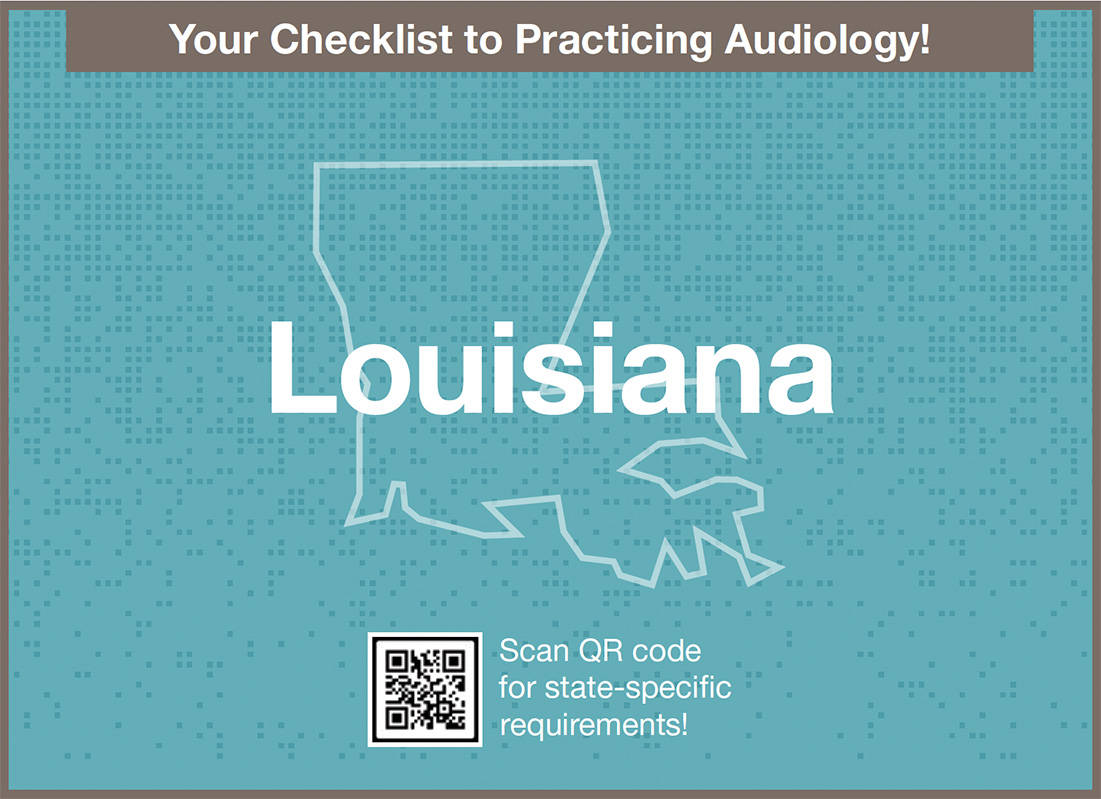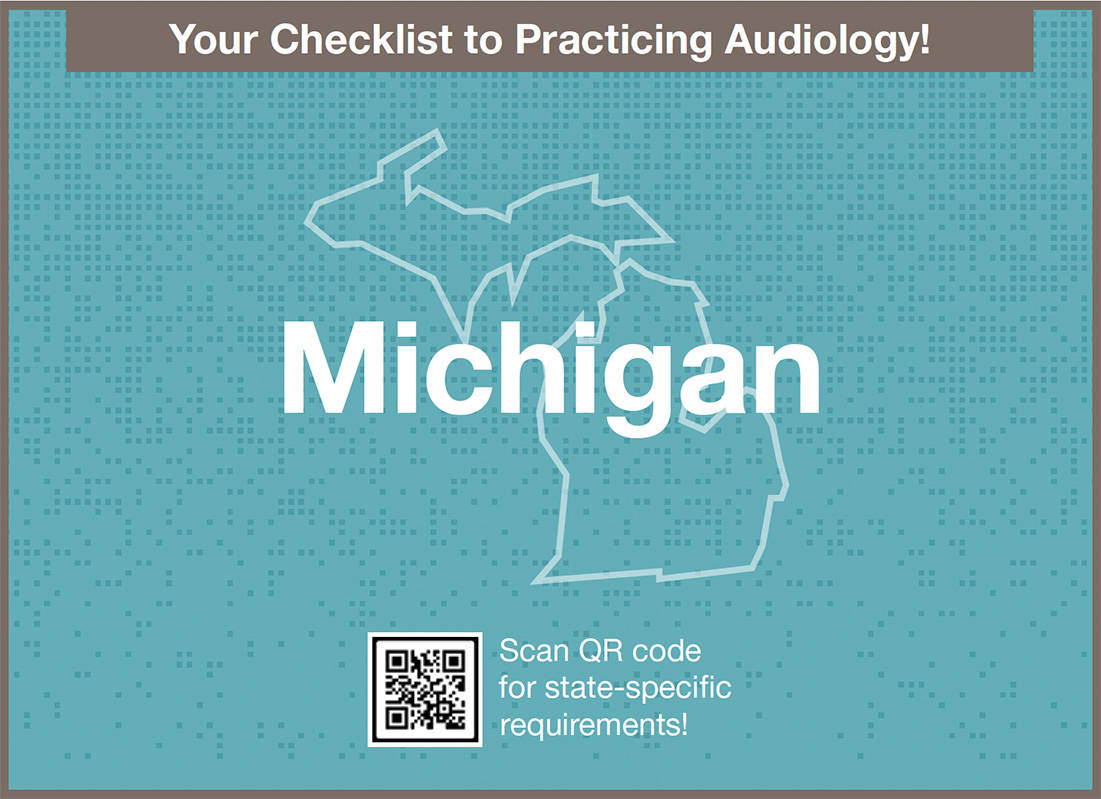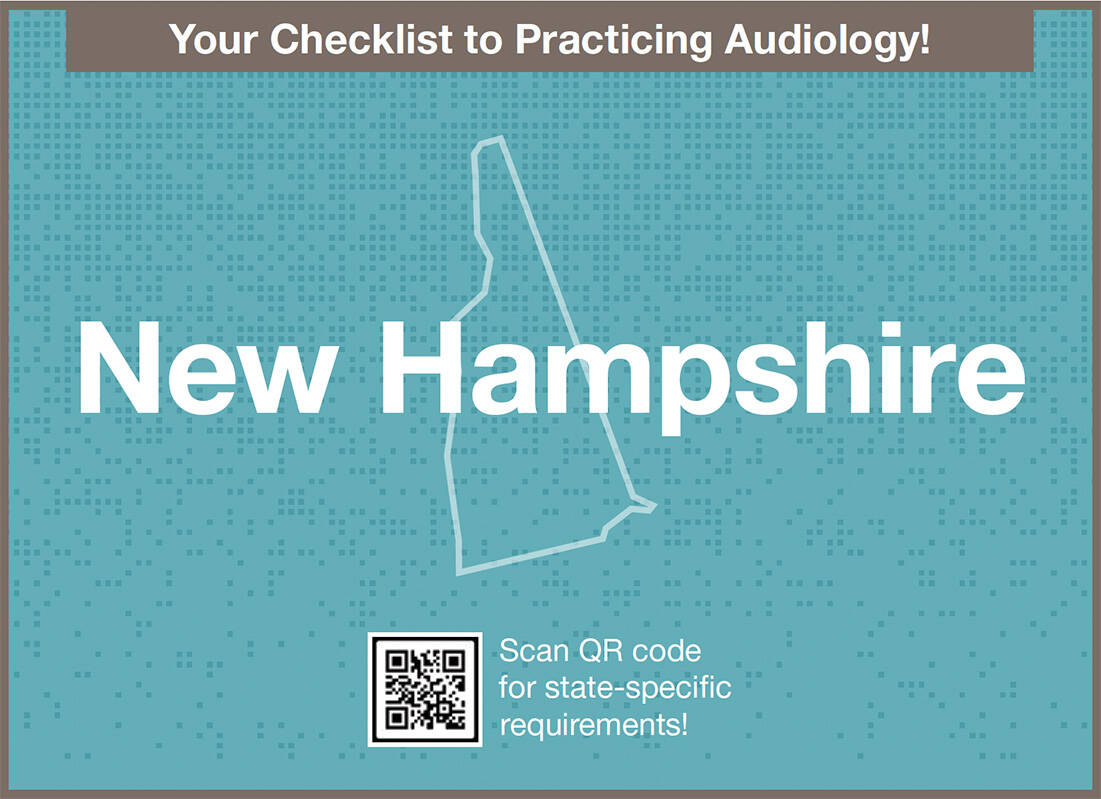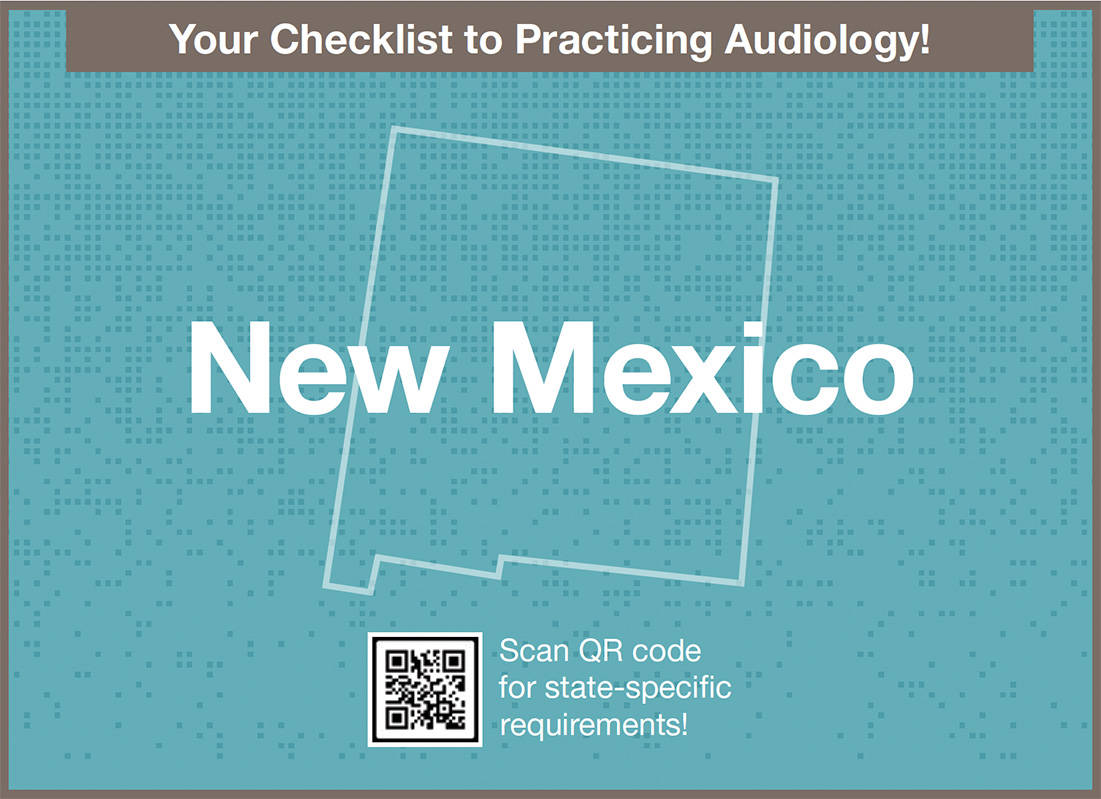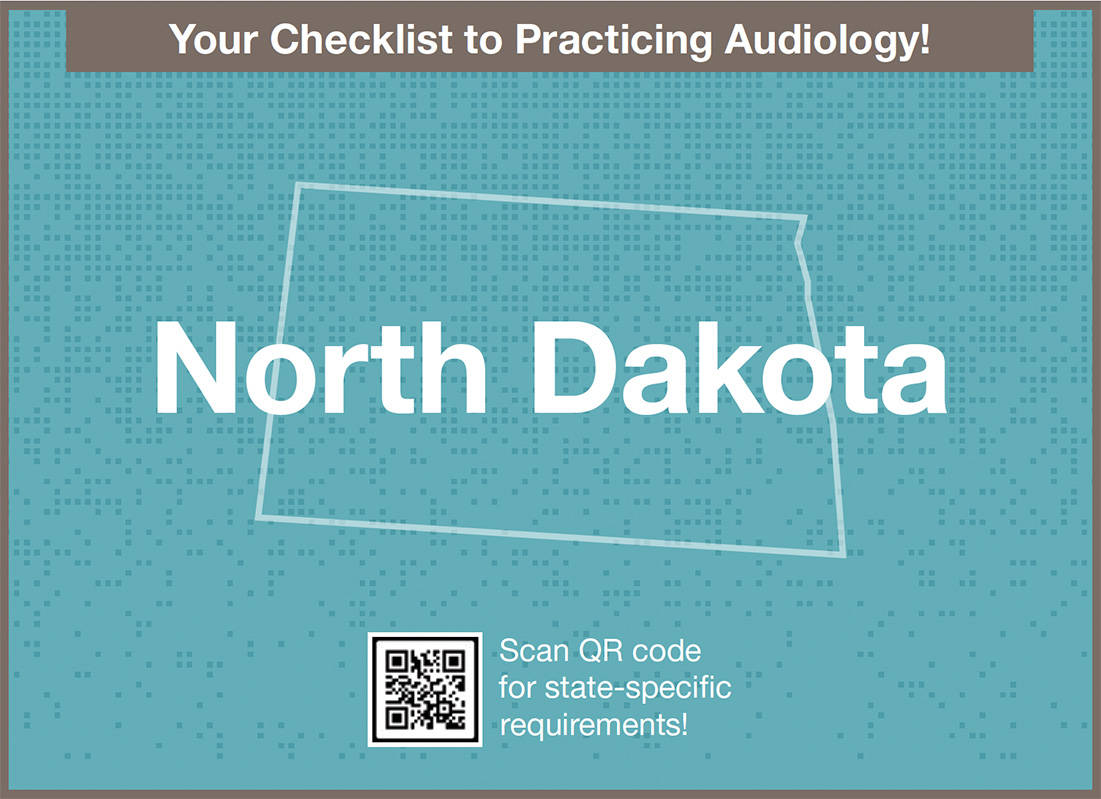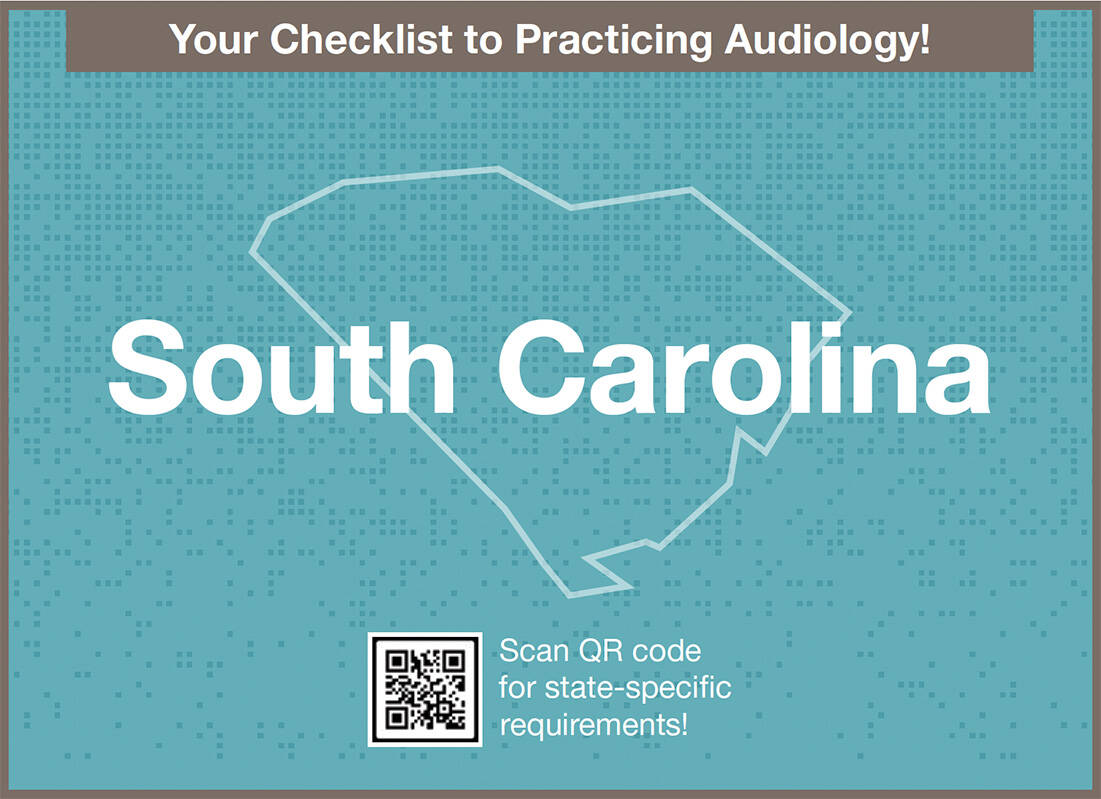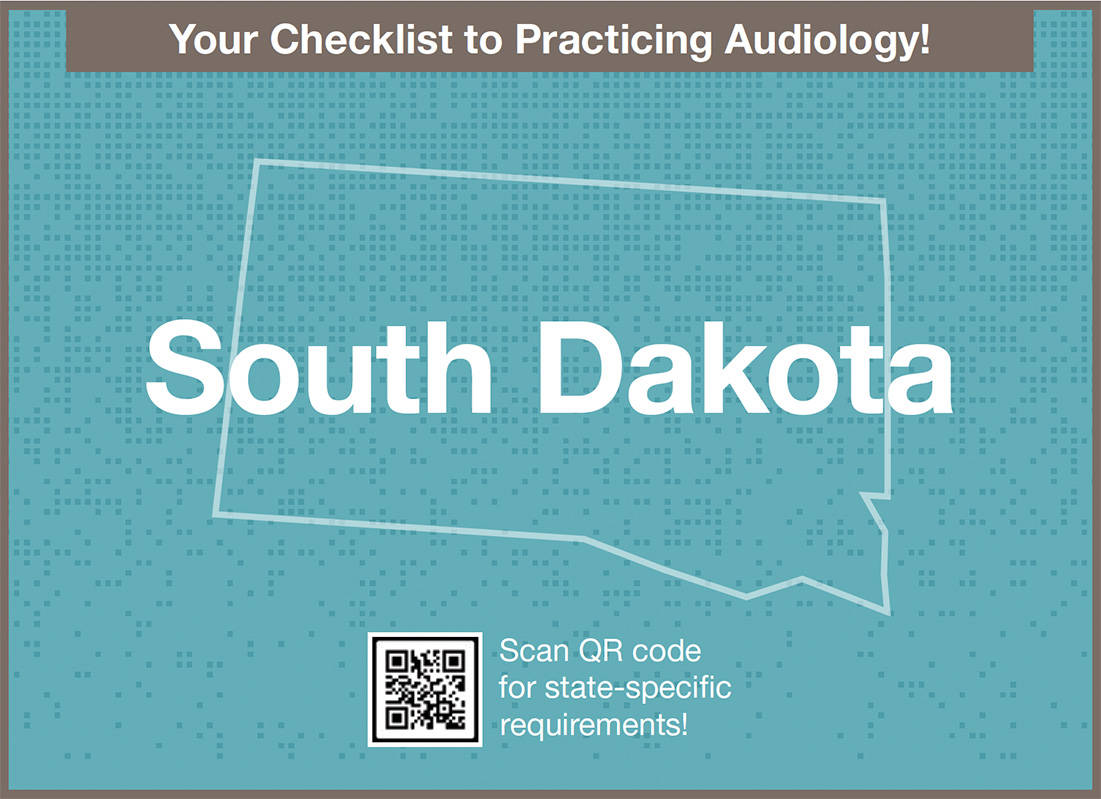Please note that state licensing statutes and regulations may change frequently so always check with the state licensing board for the most up-to-date information. Another valuable resource for state licensing information is the website of the National Council of State Board of Examiners for Audiology and Speech-Language-Pathology.
Find your State Requirements
- Master’s degree in audiology (if degree conferred prior to January 1, 2007); doctoral degree in audiology if degree conferred after January 1, 2007.
- Evidence of the successful completion of supervised clinic practicum experiences from an educational institution, or its cooperating programs, that is approved by the board as delineated in the rules of the board.
- Pass an examination in speech-language pathology or audiology approved by the board.
OR - Current CCC OR an equivalent certification from an accrediting Association or Academy in the area for which licensure is applied.
Other:
Continuing Education: 10 hours of continuing education per year
ASLP-IC: Yes
- Holds a master’s degree or doctorate in audiology from an accredited educational institution approved by the department; and either has (i) a Certificate of Clinical Competence in Audiology from the American Speech-Language-Hearing Association or the equivalent of the certificate; or (ii) practiced audiology for two years as of January 1, 1986, or is in the process of completing the year of supervised clinical experience required for the Certificate of Clinical Competence of the American Speech-LanguageHearing Association
Other:
Continuing Education: No Requirement
ASLP-IC: Yes
Audiologists who practice independently must also obtain an Alaska Business License.
- A doctoral degree with an emphasis in audiology from a nationally or regionally accredited college or university in an accredited program
- Completed supervised clinical rotations in audiology from a nationally or regionally accredited college or university in an accredited program
- Pass an examination
- OR hold a current CCC. The applicant must have completed the examination within three years before the date of application for licensure pursuant to this article.
- Not have had a license revoked or suspended by a state within the preceding two years and not be presently ineligible for licensure in any state because of a prior revocation or suspension.
- Pass jurisprudence and ethics examination related to this chapter within six months after initial licensure.
Other:
Continuing Education: 20 hours every two years
ASLP-IC: No
- Master’s degree in audiology obtained on or before December 30, 2006 or a doctoral degree obtained after January 2007 from an educational institution approved by the board.
- Submit evidence of the completion of the educational, clinical experience, and employment requirements, which shall be based on appropriate national standards and prescribed by the rules adopted under this chapter; and
- Pass an examination approved by the board before the board approves a license.
- The board may waive the examination and grant a license to any person who is ABA or ASHA certified
Other
Continuing Education: 10 hours per year
ASLP-IC: Yes
- Effective January 1, 2008, hold a doctoral degree or equivalent in audiology from an accredited educational institution. (Prior to January 1, 2008, hold a master’s degree or equivalent in audiology from an accredited educational institution.)
- Have completed 300 hours of supervised clinical practicum in three different clinical settings.
- Have completed the final year externship under the direction of an audiology doctoral program. (Prior to January 1, 2008, completed 36 weeks of full-time or 72 weeks of part-time supervised Required Professional Experience (RPE).)
- Effective February 5, 2021, pass the national audiology exam administered by the Educational Testing Service (ETS) Praxis Series 5343 with a minimum score of 162 or Praxis Series 5342 with a minimum score of 170.
Other:
Continuing Education: 24 hours every two years
ASLP-IC: No
- Doctoral degree in audiology from a program accredited by CAA or CHEA; OR
- Earned a master’s degree from program with a concentration in audiology that was conferred before July 1, 2007, from a program of higher learning that is or, the time the applicant was enrolled and graduated, was offered by an institution of higher education or postsecondary education accredited by the CAA within ASHA, or another program approved by the Director; and obtained a certificate of clinical competency in audiology from the American Speech-Language-Hearing Association (ASHA).
Other:
Continuing Education: 10 hours per renewal period
ASLP-IC: Yes
- Master's or doctorate degree in audiology from a program accredited at the time of the applicant's graduation by the Educational Standards Board of the American Speech Language-Hearing Association (ASHA) or the Accreditation Commission for Audiology Education (ACAE).
- Successful completion of the NTE Specialty Area Test in audiology administered by the Educational Testing Service (ETS), Princeton, New Jersey. The passing score for Connecticut licensure is 170.
Other:
Continuing Education: 20 hours every two years
ASLP-IC: No
- For licensure as an audiologist, has current ABA or ASHA certification or has met the following requirements:
- Possession of a doctoral degree in audiology from an accredited college or university, except that audiologists licensed in Delaware prior to July 10, 2009, who have maintained Delaware licensure, shall be exempted from this requirement.
- Successful completion of a national examination in the area of the applicant’s specialty prepared by a national testing service approved by the Division.
Other:
Continuing Education: 30 hours every two years
ASLP-IC: Yes
- Master’s degree or a Doctoral degree (Ph.D. or Au.D.) in audiology from a recognized educational institution whose audiology program is accredited by the Council on Academic Accreditation in Audiology and Speech Language Pathology, an accrediting body recognized by the United States Department of Education, or an equivalent accrediting body as determined by the Board
- Passing score on the National Examination in Audiology (PRAXIS II: Subject Assessment in Audiology) as determined by the Education Testing Service (ETS) and the score was obtained within the five (5) years before the date of the application for licensure; OR
- Completed a period of supervised experience; proof that he or she has practiced audiology for at least three (3) years of the five (5) years before the date of the application for licensure; and proof that he or she is certified by the American Speech-Language-Hearing Association or the American Board of Audiology or proof that the applicant obtained a passing score on the National Examination in Audiology.
Other:
Continuing Education: 20 hours every two years
ASLP-IC: No
Hearing Aid Dispensing: Audiologists must register as a hearing aid dealer/dispenser
- Doctoral degree with a major emphasis in audiology: Applicants who earned a doctoral degree from an approved program before January 1, 2008, must complete sixty (60) semester hours, 24 of which must be in audiology. Applicants who earned a doctoral degree from an approved program after January 1, 2008, must complete seventy-five (75) semester hours
- 300 clock hours of supervised experience (clinical practicum) with at least 200 hours in the area of audiology
- Eleven (11) months professional employment experience. This requirement may be met if the applicant holds a doctoral degree, meets the requirements of Section 468.1155, F.S. and can demonstrate one- year clinical work experience within the doctoral program.
- Every applicant for licensure as an audiologist with a master’s degree conferred before January 1, 2008, shall document that prior to licensure the applicant completed one year clinical work experience
- Proof of passing the Praxis exam no more than three (3) years prior to the date of this application
Other:
Continuing Education: 30 hours every two years
ASLP-IC: Yes
- Doctoral degree with emphasis in audiology from a program accredited by an accrediting agency recognized by the Department of Education
- Evidence of professional experience equivalent to a minimum of 12 months of full-time supervised clinical practicum. The required professional experience must be approved by an academic program.
- Passage of a board approved national examination in audiology: A person who holds a license in another jurisdiction or holds a Certificate of Clinical Competence as issued by the American Speech-Language-Hearing Association, or holds certification of the American Board of Audiology, provided the applicant otherwise meets the eligibility requirements as defined in Code Section 43-44-8, may apply for a Georgia license without examination.
Other:
Continuing Education: 20 hours every two years
ASLP-IC: Yes
- A doctor of audiology (AuD) degree or a board certification in audiology from the ABA or ASHA certificate of clinical competence in audiology
- An applicant for licensure who holds a board certification issued by the ABA shall arrange to have sent directly to the board a credential verification letter from the ABA, dated within six months of the date of the application, indicating the applicant possesses the board certification in audiology, the date the certification was issued, and the applicant's ABA certification number
- Passage of an examination (ETS)
Other:
Continuing Education: No
ASLP-IC: No
- A Doctoral or other recognized degree from a nationally accredited school for audiology with a curriculum acceptable to the board
- Successfully complete a supervised academic clinical practicum as part of a doctoral program that satisfies Section 54-2912(b), Idaho Code, or supervised postgraduate experience that is substantially equivalent to such a practicum. An applicant who has insufficient supervised experience as part of the doctoral program may obtain the necessary experience under a provisional permit as provided in these rules.
- Pass the audiology examination given by PRAXIS
Other:
Continuing Education: 10 hours per year
ASLP-IC: Yes
- Completion of a Master’s degree in audiology (prior to August 1, 2008) or a doctoral degree in audiology from a program approved by the Illinois Department of Professional Regulation
- Passage of a national examination
- Completion of 1500 clock hours of supervised experience or evidence of an AuD degree
Other:
Continuing Education: 20 hours every two years
ASLP-IC: No
- Possess a doctoral degree or equivalent (defined as minimum of 75 semester hours of graduate study including specific course work) from an accredited educational program recognized by the Board
- Certification of completion of 1,820 clock hours of supervised clinical practicum, including a clinical experience that is equivalent to 12 months full-time supervised experience obtained during the doctoral degree program
- Passage of a Professional Examination Service exam
- Passage of an Indiana jurisprudence exam with a score of 75 or higher
Other:
Continuing Education: 36 hours every two years
ASLP-IC: Yes
- Master’s or doctoral degree in audiology
- Verification of nine months of supervised clinical experience under the supervision of a licensed audiologist or as part of a doctoral degree
- Passage of the PRAXIS examination
Other:
Continuing Education: 30 hours every two years
ASLP-IC: Yes
Hearing Aid Dispensing: Must obtain separate license
- ividual seeking licensure as an audiologist on or after January 1, 2021, must possess a doctoral degree from an educational institution with standards consistent with the state universities of Kansas and approved by the Secretary pursuant to rules and regulations
- Completion of a postgraduate professional experience (or completed as part of a doctoral degree in audiology)
- Passage of a national examination in audiology
Other:
Continuing Education: 20 hours every two years
ASLP-IC: Yes
Hearing Aid Dispensing: Requires separate license but exempt from written and practical examination
- degree in the area of audiology or its equivalent from a program accredited by the Council for Academic Accreditation (CAA) or the Accreditation Commission for Audiology Education (ACAE)
- Passage of a national Praxis exam in audiology
Other
Continuing Education: 30 hours every two years
ASLP-IC: Yes
Hearing Aid Dispensing: Must obtain separate license
- degree from an accredited educational program
- Completion of a supervised clinical practicum through an accredited educational program
- Passage of an examination approved by the Board (PRAXIS)
Other
Continuing Education: 10 hours per year
ASLP-IC: Yes
- or doctoral degree from a CAA accredited program or degree determined to be equivalent by the board
- Supervised clinical practicum
- Passage of the PRAXIS exam
Other
Continuing Education: 10 hours every year
ASLP-IC: Yes
- Doctoral degree that incorporates the academic coursework and minimum number of supervised clinical training
- Academic coursework must be consistent with ACAE or CAA standards
- Completion of clinical training supervised by a state licensed audiologist or individual holding ABA certification or CCC
- Passage of PRAXIS examination
- Demonstration of oral English competency
Other
Continuing Education: 30 hours every two years
ASLP-IC: Yes
- Applicants who apply for licensure as an Audiologist on or after October 1, 2016, or whose applications are pending as of that date must submit evidence that the applicant either: (a) meets the January 1, 2012 ASHA Standards and Implementation Procedures for a Certificate of Clinical Competence in Audiology available at http://www.asha.org/certification/2012-Audiology-Certification -Standards/; or (b) meets the April 1, 2012, requirements for board certification from the American Board of Audiology available at http://www.boardofaudiology.org.
Other
Continuing Education: 20 hours every two years
ASLP-IC: No
- Possess a master's or doctoral degree in audiology from a regionally accredited college or university approved by the board; have completed at least 9 months of supervised clinical experience in audiology; and have successfully passed the PRAXIS examination in audiology
- Beginning April 22, 2021, completion of a one-time training to identify victims of human trafficking is required for individuals seeking licensure that meets the standards of Administrative Rule 338.1a.
- Beginning June 1, 2022, completion of 2 hours of implicit bias training within the 5 years immediately preceding issuance of the license or registration is required.
Other
Continuing Education: 20 hours every two years
ASLP-IC: No
- Prior to August 30, 2007, an audiology applicant must possess a master's or doctoral degree in audiology from an accredited educational institution (accredited by CAA, US Department of Education or an equivalent as determined by the Commissioner)
- After August 30, 2007, an audiology applicant must possess a doctoral degree with an emphasis in audiology, or its equivalent as determined by the commissioner, from an accredited educational institution (accredited by CAA, US Department of Education or an equivalent as determined by the Commissioner).
- An applicant must complete the graduate or doctoral clinical experience required by the American Speech-Language-Hearing Association, the American Board of Audiology, or an equivalent, as determined by the commissioner
- Passage of the PRAXIS in audiology
Other
Continuing Education: An applicant for licensure renewal must meet the requirements for continuing education stipulated by the American Board of Audiology or the American Speech-Language-Hearing Association or 30 hours every two years.
ASLP-IC: Yes
- Doctoral degree in audiology from an institution recognized by the State Board of Health. Licensees currently licensed as an audiologist with a master’s degree will be “grandfathered” in and will remain licensed so long as they maintain their national certification. In addition, applicants for an audiology license who are already licensed as an audiologist in another state with only a master’s degree will be accepted for licensure in Mississippi if they are currently nationally certified.
- For applicants awarded a doctoral degree, the Supervised Professional Employment Plan requirement may be met prior to awarding of the degree, provided the equivalent of the Supervised Professional Employment Plan is an integral part of the course of study which leads to the awarding of a doctoral degree.
- Pass the National Examination in Audiology. Each year at its first meeting, the Advisory Council will recommend to the State Board of Health a passing score for the coming year.
Other:
Continuing Education: 20 contact hours every two years
ASLP-IC: Yes
- Hold a master's or a doctoral degree from a program that was awarded "accreditation candidate" status or is accredited by the Council on Academic Accreditation of the American Speech-Language-Hearing Association or other accrediting agency approved by the board in the area in which licensure is sought;
- Submit official transcripts from one or more accredited colleges or universities presenting evidence of the completion of course work and clinical practicum requirements equivalent to that required by the Council on Academic Accreditation of the American Speech-Language-Hearing Association or other accrediting agency approved by the board;
- Present written evidence of completion of a clinical fellowship from supervisors. The experience required by this subdivision shall follow the completion of the requirements of subdivisions (1) and (2) of this section*. This period of employment shall be under the direct supervision of a person who is licensed by the state of Missouri. Persons applying with an audiology clinical doctoral degree are exempt from this provision; and
- Pass an examination promulgated or approved by the board.
Other
Continuing Education: 30 hours every two years
ASLP-IC: Yes
- A minimum of a Doctor of Audiology degree (Au.D.) or a Ph.D. in audiology from a program accredited by the CAA or ACAE or equivalent; and
- have passed the national Praxis examination in audiology or its equivalent.
- An audiologist licensed prior to January 1, 2007, who maintains that license in good standing is not required to obtain a doctorate.
Other
Continuing Education: 10 hours per year
ASLP-IC: Yes
- Prior to 2007, evidence of a master’s degree in audiology. After September 1, 2007, evidence of a doctoral degree in audiology
- Completion of a supervised clinical practicum. Supervisor must be a NE licensed audiologist, an individual who meets the NE licensure requirements of a CCC holder
- Passage of the PRAXIS examination
Other
Continuing Education: 20 hours every two years
ASLP-IC: Yes
- An applicant for a license to engage in the practice of audiology must satisfy the academic requirements of an educational program accredited by the American Speech-Language-Hearing Association or its successor organization approved by the Board; or the Accreditation Commission for Audiology Education or its successor organization approved by the Board.
- Passage of an examination
- The Board may issue a license without examination to a person who holds: A current certificate of clinical competence issued by the American Speech-Language-Hearing Association in the field of practice for which the person is applying for a license; or current certification from the American Board of Audiology.
Other
Continuing Education: 15 hours per year
ASLP-IC: No
Hearing Aids: Must request an endorsement and pass an examination (identical to the examination required for the licensure of hearing aid specialists).
- Possess at least a master's degree or doctoral degree in audiology from an educational institution recognized by the American Academy of Audiology or the American Speech Language Hearing Association
- Each audiologist applicant shall pass a written national examination in audiology administered by Education Testing Services of Princeton, New Jersey; the American Academy of Audiology; or the American Speech-Language-Hearing Association.
Other:
Continuing Education: 20 hours every two years
ASLP-IC: Yes
Hearing Aids: Audiologists must register as hearing aid dealer
- A master’s or doctoral degree in audiology accredited by ACAE or CAA
- Completion of a clinical internship supervised by a state licensed audiologist
- Passage of the PRAXIS examination in audiology
- Completion of jurisprudence on-line orientation
Other:
Continuing Education: 20 hours every two years
ASLP-IC: No
Hearing Aids: Audiologists may now dispense under their audiology license (law changed 2019)
- A master's degree in audiology, communication disorders or equivalent degree in audiology or communication disorders awarded prior to January 1, 2007; or a doctoral degree in audiology or equivalent degree regardless of degree name.
- Proof of having earned certification in audiology from American board of audiology (ABA); or the American speech-language and hearing association (ASHA)
- proof of having passed a nationally recognized standard examination in audiology;
- Proof of having passed the jurisprudence examination with a grade of no less than seventy percent;
- If the applicant was awarded a master’s degree in audiology or communication disorders or equivalent degree in audiology or communication disorders prior to January 1, 2007, the applicant must also provide proof of at least six months’ experience in the dispensing of hearing aids or other evidence as determined by the board in either a graduate training program or in a work training experience;
Other:
Continuing Education: 20 hours every two years
ASLP-IC: No
- Completion of a graduate degree in audiology from a New York State registered licensure qualifying program, a program accredited by the American Speech Language and Hearing Association (ASHA), or the equivalent. To be considered equivalent, the educational program must culminate in a graduate degree from a college or university acceptable to the Department. It must include a practicum and 75 semester hours of courses as specified in NY regulations. The 75 semester hours must be at the graduate level.
- Completion of a clinical practicum supervised by a NY state licensed audiologist
- Passage of the Praxis examination (passing score of 162)
Other:
Continuing Education: 30 hours every three years
ASLP-IC: No
Hearing Aids: Licensed audiologists must register as a hearing aid dispenser (no additional requirements)
- Doctoral degree in audiology (or master’s degree in audiology if obtained prior to October 1, 2007)
- 1,800 clock hours of professional experience directly supervised by an audiologist who is State-licensed
- Pass an examination established or approved by the Board.
Other:
Continuing Education: 30 hours every three years
ASLP-IC: Yes
- Doctoral degree in audiology
- Passage of the PRAXIS exam
Other:
Continuing Education: 10 hours per year
ASLP-IC: No
Hearing Aids: Audiologists must obtain a hearing instrument specialist license to dispense hearing aids.
- Doctor of Audiology
- Educational requirements shall be deemed met if the applicant is certified by the ABA or ASHA
- Passage of the Praxis
Other:
Continuing Education: 20 hours every two years
ASLP-IC: yes
- Hold not less than a post-baccalaureate residential or post-masters’ distance education professional Doctor of Audiology (AuD) degree, a Doctor of Philosophy (PhD) degree with an emphasis in audiology or its equivalent as determined by the Board;
- If applying with a Doctor of Audiology (AuD) professional degree, demonstrate preparation that includes three (3) years of didactic coursework and clinical education equivalent to a twelve-month full-time rotation or externship;
- Passage of an examination
- Attest to their status as either a United States citizen, a United States noncitizen national or a qualified alien
Other:
Continuing Education: 20 hours every two years
ASLP-IC: Yes
- Prior to August 30, 2007, the applicant must possess a master’s or doctoral degree in audiology;
- If the degree was awarded after August 30, 2007, the applicant must possess a doctoral degree with an emphasis in audiology, or an equivalent degree as determined by the board. For those applicants completing their graduate program after January 1, 2020, the academic program must comply with standards outlined in the 2020 Certification Standards for Audiologists as promulgated by the Council For Clinical Certification (CFCC)
- For applicants completing their graduate program after January 1, 2020, completion of a program of clinical work incorporated into an accredited graduate program awarding an Au.D. in audiology and supervised by a state licensure audiologist.
- Passage of the PRAXIS examination
Other:
Continuing Education: 30 hours every two years
ASLP-IC: No
- Doctoral degree from an educational program approved by the Board (accredited by CHEA or DOE)
- Passage of the PRAXIS examination
- Completion of three hours of Board approved education in child abuse recognition and reporting
Other:
Continuing Education: 20 hours every two years
ASLP-IC: No
Hearing Aid Dispensing: Must register as a hearing aid dealer/dispenser (no exam)
- Doctorate degree in audiology from a regionally accredited university
- Present evidence of practicum experience that is equivalent to a minimum of twelve (12) months of full-time, supervised experience, that may be completed as part of the graduate degree
- Passage of a national examination
Other:
Continuing Education: 20 hours every two years
ASLP-IC: Yes
- Doctoral degree in audiology from a regionally accredited institution/program equivalent to CAA accreditation
- Completion of a clinical practicum under the supervision of a state licensed audiologist
- Passage of an examination
Other:
Continuing Education: 16 hours every two years
ASLP-IC: Yes
- Master's or doctorate degree in audiology from a regionally accredited educational institution;
- Complete the supervised clinical practicum experience from a regionally accredited educational institution or its cooperating programs
- Complete a period of supervised graduate professional experience in audiology as recognized by the American Speech-Language-Hearing Association or the American Academy of Audiology;
- Pass a national standardized examination in audiology as recognized by the American Speech-Language-Hearing Association or the American Academy of Audiology.
Other:
Continuing Education: 12 hours per year
ASLP-IC: No
- Completion of an AuD degree or other doctoral degree as approved by the Board
- Completion of a clinical practicum under the supervision of an audiologist who is state licensed or holds ABA or ASHA certification
- Passage of the PRAXIS examination
- Passage of the TN jurisprudence examination
Other:
Continuing Education: 20 hours every two years
ASLP-IC: Yes
- Doctoral degree in audiology from a program accredited by a national accrediting organization, approved by the department and recognized by the US Department of Education
- Completion of clinical experience obtained as part of the doctoral program and under the supervision of a state licensed audiologist
- Passage of an examination
Other:
Continuing Education: 20 hours every two years
ASLP-IC: No
- Completion of a clinical doctorate in audiology (AuD)
- Completion of a clinical practicum supervised by a state licensed holder, a CCC holder or equivalent
- Passage of a national standardized examination in audiology
Other:
Continuing Education: 20 hours every two years
ASLP-IC: Yes
- A master’s degree or equivalent in audiology or a doctoral degree in audiology, or an equivalent doctoral degree regardless of name, from a program that is accredited by an accrediting agency recognized by the Council for Higher Education Accreditation, or its successor, or by the United States Department of Education and operated by a college or university accredited by a regional or national accrediting organization.
- Completed a supervised clinical practicum in audiology
- Passed an examination in audiology approved by the Director, which shall include a section that is equivalent to the hearing aid dispensers examination described in section 3295 of this chapter. An audiologist who has passed this examination is not required to take the hearing aid dispensers examination required by section 3295.
Other:
Continuing Education: 30 hours every three years
ASLP-IC: Yes
- Holds a current and unrestricted certification issued by ASHA OR holds a current and unrestricted certification issued by the ABA or any other accrediting body recognized by the board and provides documentation of having passed the qualifying examination from an accrediting body recognized by the board; OR
- Provides documentation of (i) graduation from an audiology program accredited by the Council on Academic Accreditation of ASHA or an equivalent accrediting body as recognized by the board; and (ii) having passed the qualifying examination from an accrediting body recognized by the board.
Other:
Continuing Education: ten hours per year
ASLP-IC: Yes
- Masters or doctoral degree in audiology from a CAA accredited program or equivalent
- Completion of a clinical practicum
- Passage of the PRAXIS examination
Other:
Continuing Education: 30 hours every three years
ASLP-IC: Yes
- Master’s or doctoral degree in audiology
- Clinical practicum
- Passage of the national examination in audiology
- Passage of a jurisprudence examination
Other:
Continuing Education: 20 hours every two years
ASLP-IC: Yes
- Doctoral degree in audiology
- Clinical practicum
- Passage of PRAXIS
- Passage of a practical examination in the fitting of hearing aids OR completion of education and training that the board determines to be equivalent
Other:
Continuing Education: 20 hours every two years
ASLP-IC: Yes
- Evidence of ABA or ASHA Certification OR Submission of transcript, PRAXIS score and Supervision Clinical Year Fellowship Form
Other:
Continuing Education: 12 hours per year
ASLP-IC: Yes







